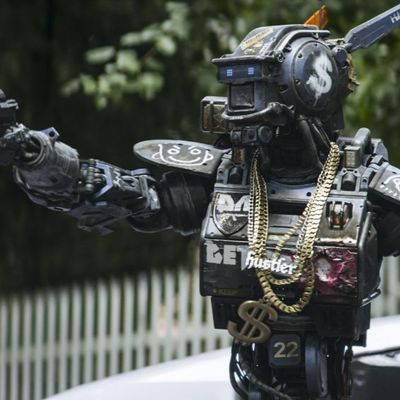
It’s easy to imagine the writer’s pitch for Chappie went something along the lines of “Avatar meets RoboCop meets Short Circuit starring Jar Jar Binks.” I’m kidding: Jar Jar was probably left out of that meeting, but he’s in the movie in spirit, reincarnated as a sentient robot whose mind evolves quickly from childlike to sophisticated but who continues to babble in the same pidgin English. Directed by District 9’s Neill Blomkamp, Chappie is a clunky mix: a sentimental comedy-thriller with hideous violence and a profound cynicism about the inexorability of the computer-enhanced surveillance state. It gets points for weirdness, but it’s still some fucked-up shit.
The context — spelled out by Anderson Cooper, who should stop playing himself in fictional movies because it undermines his dignity even more than his silly laugh, and surely his country house is paid for by now — is that Johannesburg has the first robotic police force, its manufacture overseen by bossypants Sigourney Weaver (in a rare paycheck performance). Among her employees is a sweet, nerdy Indian guy (Dev Patel, marginally more believable, on account of being an actual Indian, than Fisher Stevens in Short Circuit) who dreams of instilling consciousness in these buckets of bolts. On the other side of the humanist equation is Hugh Jackman as an incipient fascist who’d love the police to employ his prize-flying robot behemoths that can wipe out whole blocks without breaking a sweat.
Chappie’s wild card — its most original aspect — is the invention of three unsavory, Road Warrior–esque paramilitary punks who kidnap Patel and allow him to finish his A.I. experiment so they can use his near-unstoppable robot (whom they dub “Chappie”) in a heist. (The need to pay off a debt to a vicious, gorillalike gang leader.) Ninja (played by Ninja) is the cut-muscled, tattooed bull-boy, but it’s blonde, eyebrowless Yolandi (rocker Yo-Landi Visser) who turns unexpectedly maternal and makes Chappie her little boy.
Chappie — articulated by Blomkamp mascot Sharlto Copley — has his finer points. As a scaredy-cat “child,” he throws up his steel arms and cowers spastically behind pieces of furniture, and his clumsy use of gangsta slang is funny in small doses. I like his tin-man mandibles and square peepers. But that voice! It really is as if Jar Jar and C-3PO had mated to create the world’s most insufferable automaton. Chappie (both the character and the film) might have been saved if his awakening had a trace of awe, if the miracle of his existence didn’t seem so taken-for-granted. But there’s nothing miraculous, poetic, or even fresh about Blomkamp’s palette. The cartoonishness of District 9’s extraterrestrial shrimp turned out to be the key to the film’s charm — a bigger budget exposes his flat, network-TV techniques, and he can’t begin to reconcile Chappie’s wildly disparate tones.
Patel and Jackman don’t rise above their material, but Yo-Landi and Ninja do. He keeps up the one-note psycho bit for half the movie before confusion sets in: His robot is playing with dolls, and his murderous moll has been rendered boneless by sudden mommyhood. My initial aversion to Visser yielded to Chappie-like feelings of love. A few notes of softness mixed into her patented hardness becomes her. To give him his due, Blomkamp knows the value — amid this computerized jumble — of a human voice.


